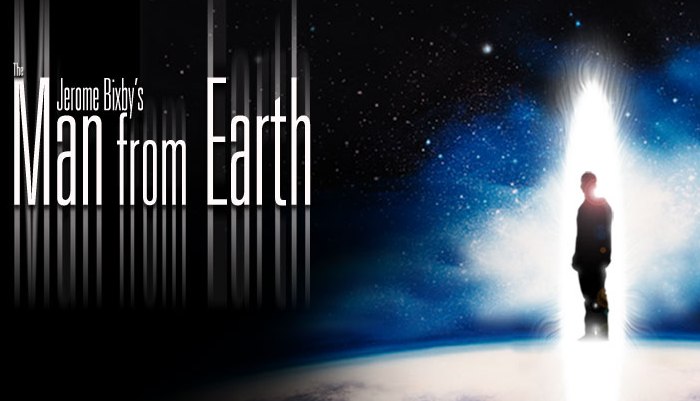This month’s movie came from a Twitter suggestion from our own Leslie Stewart! Thanks for letting me snag it! ^_^
This month I decided to review an older movie that I’d never seen instead of a new release. The Man from Earth is a 2007 movie written by Jerome Bixby about a professor named John Oldman who, during a going away party, reveals to his colleagues that he is in fact 14,000 years old. Over the course of the evening, they explore the possibility of his claim, and it leads to questions of science, faith and humanity in the face of an otherwise unknown idea: the real consequences of immortality.
The premise is set in a very interesting way; because the man is a professor, so are his colleagues, and we as an audience therefore have representatives from a wide range of fields, which provides a matching range of perspectives. We have a biologist, an anthropologist, a psychologist, a chemist, as well as a student. Each brings his or her own questions and experience to the situation.
John Oldman gives them little evidence apart from what he can tell them of his own memories, which he admits are mostly conjecture based on things he’s learned; he remembers seeing something happen, and so researches it, and when human knowledge can name it, then so can he. He guesses, for example, that he saw the British Isles before they became islands, based on later scientific research on the changing shape of continents. There are other small clues as well, such as what might be an original van Gogh.
What his colleagues, and we by extension, are asked to explore is nothing less than the implication of really living forever. He emphasizes to them that no matter how long a man lives, he can only have the best knowledge that the species as a whole has at any given point in time. He tells them he has done no more than any of them would, if given the proper time.
The movie is part science fiction and part psychology, exploring how people of varying backgrounds and beliefs react to this knowledge. This parallels the range of human belief, and illustrates how diverse humans are, all while walking the line between reality and fiction. The other professors are not sure if John is insane or if he is lying and with nothing but his words, they must search inside themselves to find the answers to the questions they are asking him.
As the evening progresses, the room grows dark, lit only by the fire cracking in the fireplace, and John turns on Beethoven while he reveals some of his greatest secrets. The professors’ perspectives begin to shift around this campfire and for a moment they are transported both into the upper reaches of human possibility and back to the most basic human condition, huddling together against the unknown.
Is John Oldman really what he says? Or is he simply offering them a glimpse, a way to reach back into human history and touch the ancestral roots, while still gazing up at the stars and wondering where it all began?







Leave A Comment
You must be logged in to post a comment.